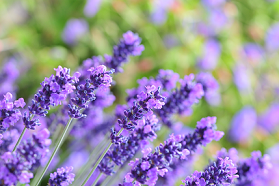Lavender is an herb. The flower and the oil of lavender are used to make medicine. Lavender (scientific name Lavandula angustifolia) is commonly contaminated with related species, including Lavandula hybrida, which is a cross between Lavandula angustifolia and Lavandula latifolia, from which lavandin oil is obtained.
Contents
Uses
- Lavender is used for restlessness, insomnia, nervousness, and depression. It is also used for a variety of digestive complaints including meteorism (abdominal swelling from gas in the intestinal or peritoneal cavity), loss of appetite, vomiting, nausea, intestinal gas (flatulence), and upset stomach.
- Some people use lavender for painful conditions including migraine headaches, toothaches, sprains, nerve pain, sores, and joint pain. It is also used for acne and cancer, and to promote menstruation.
- Lavender is applied to the skin for hair loss (alopecia areata) and pain, and to repel mosquitoes and other insects.
- Some people add lavender to bathwater to treat circulation disorders and improve mental well being.
- By inhalation, lavender is used as aromatherapy for insomnia, pain, and agitation related to dementia.
- In foods and beverages, lavender is used as a flavor component.
- In manufacturing, lavender is used in pharmaceutical products and as a fragrance ingredient in soaps, cosmetics, perfumes, potpourri, and decorations.
Benefits
- Lavender contains an oil that seems to have sedating effects and might relax certain muscles.
Cautions
Lavender is LIKELY SAFE for most adults in food amounts and POSSIBLY SAFE in medicinal amounts. When taken by mouth, lavender can cause constipation, headache, and increased appetite. Applying lavender to the skin can sometimes cause irritation.
- Children: Applying products to the skin that contain lavender oil might not be safe for young boys who have not yet reached puberty. Lavender oil seems to have hormone effects that could disrupt the normal hormones in a boy’s body. In some cases, this has resulted in boys developing abnormal breast growth called gynecomastia. The safety of these products when used by young girls is not known.
- Pregnancy and breast-feeding: Not enough is known about the use of lavender during pregnancy and breast-feeding. Stay on the safe side and avoid use.
- Surgery: Lavender might slow down the central nervous system. If used in combination with anesthesia and other medications given during and after surgery, it might slow down the central nervous system too much. Stop using lavender at least 2 weeks before a scheduled surgery.
References
Source: WebMD, “Lavender”, www.webmd.com/vitamins-supplements/
For more information see Lavender Oil

